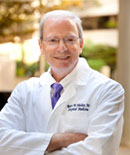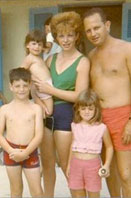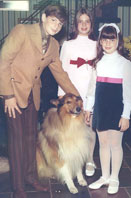Interview with Bob Wachter, MD
A Conversation with Bob Wachter, Professor
Where were you born? What is your place in the family hierarchy and what kind of kid were you?

 I was born in Brooklyn, New York before it was trendy. As was fairly typical of Jewish families at the time, we moved to Long Island when I was six months old. I am the firstborn and have two younger sisters. I was a pretty straight-arrow kid. I was very sportsy. I played baseball and hockey and became addicted to golf when I was 10 or 11. I was a fair student in high school, graduating about 120th in my class of 700. It wasn’t until I got my SATs back that I realized that I was reasonably smart.
I was born in Brooklyn, New York before it was trendy. As was fairly typical of Jewish families at the time, we moved to Long Island when I was six months old. I am the firstborn and have two younger sisters. I was a pretty straight-arrow kid. I was very sportsy. I played baseball and hockey and became addicted to golf when I was 10 or 11. I was a fair student in high school, graduating about 120th in my class of 700. It wasn’t until I got my SATs back that I realized that I was reasonably smart.
Apparently the surname, Wachter, originated in Germany, “from a distinguished family known for involvement in social, economic and political affairs.” Do you know your genealogy or you feel that you are continuing a family tradition?
I know some of my genealogy, mostly of Jewish-Polish immigrants, many of whom died in the Holocaust and some who made it to the United States. My mother’s father had eight siblings, three of whom died in the Holocaust, along with scores of cousins. My family does not have a history of political engagement or leadership. My mother’s and father’s families worked in the garment industry and my father’s father started a women’s sportswear business that my dad and my uncles went into. It did okay, but their stories taught me that I didn’t want to go into business and didn’t want to work with siblings.
Your professional voice is everywhere: in print, on the web, radio, Twitter and YouTube. Has fame been a useful tool and when did you first feel that you were able to both enjoy and manage it?
It’s very hard to figure out how well known you are because your vantage point is so biased. In the early days of the hospitalist field, I was young and it was pretty heady to be involved in this new movement as it gathered momentum. Later, when people began to ask me to sign a book or take a picture with me at SHM, I found it incredibly odd – sweet but odd. Then I remembered going to meetings when I was younger and seeing some of my professional heroes, and it made a bit more sense. I was always grateful when they were welcoming and gracious to me, so I try very hard to do the same today.
How did I get here? I was a political science major in college who wanted to be a doctor. I had no clue how to weave these things together. I never saw myself as a leader but have come to realize that I like to understand and help shape events; I like mentoring people and I take tremendous joy in the success of people that I’ve helped. For that, having people take your phone calls and answer your emails is very useful. If you can figure out how to “move the needle” and accomplish some important things while not taking yourself too seriously, it can be a lot of fun and immensely gratifying.
On that proverbial desert island, would it be hard or easy for you to disconnect? What three non-electronic items would you need to “survive?”
I am good at working my tail off, not because I am a workaholic, but because I like to try to achieve a lot of things each day, and that forces me to be efficient. But I’m pretty good at unplugging and would not have a hard time either retiring or being in a non-electronic mode. My three must-takes would be my wife, my golf clubs and the non-electronic version of the New York Times.
Have you encountered any misconceptions about the man behind the public face?
People who don’t know me sometimes think I am far more serious than I really am. It’s part of the reason I enjoy writing my blog, my tweets, and even enjoy playing Elton John in front of 2,000 people, as mortifying as it is for me to watch it on YouTube. I was my college mascot (the Penn Quaker) and I like being goofy from time to time. Part of the problem with achieving some professional success is that people may think you are a very different person than you really are. I am lighter-hearted and take myself and life much less seriously than people might otherwise think if all they know is what’s on my CV.
Who would you most like to play at the Celebrity Golf Tournament? Of your current golf partners, who offers you the most challenge?
The celebrity I’d most like to hang out with is Mel Brooks, although I’m not sure he plays golf, or maybe Jerry Seinfeld. Or maybe Stephen Sondheim. I like people who make me laugh and who are really clever. I go on a yearly golf trip with three college buddies and we all challenge each other; I am the best of the group but with handicaps, that doesn’t matter very much. I spend the bulk of every year looking forward to that trip.
What about your own upbringing has been important to share with your sons? What do you most enjoy about the paths that they are taking that may be different than yours?
My parents were, and are, extraordinarily loving and generous people who cared deeply that their kids felt good about themselves and were successful in ways that they themselves defined. Neither of my parents went to college. We were a second-generation Jewish family, not wealthy but comfortable, in New York, where being a doctor was considered a very good thing. With my folks as role models, being similarly supportive of my kids was easy. That means that I had to recognize and be okay with the fact that neither wants to be a doctor, and I am, although my stepdaughter does want to go to med school and I enjoy that. My sons are extraordinarily different from each other: my oldest, brimming with passion, wants to work in professional baseball and the younger one isn’t sure yet; he is quirky, funny and fascinating, and might become a teacher. Watching them grow up is one of life’s most amazing pleasures.
On occasion, you have shared your talent and obvious delight in music. When did you first study piano? To whose music are you drawn?
My parents made me take piano lessons from about age five. When I was 13, I threatened to run away if they wouldn’t let me stop. They did and, a year later, I realized that I liked it. What I hadn’t liked was the regimen of practicing classical music. I played in college and at the local rathskeller, where people would sometimes throw tips in my jar. My musical tastes are like Pompeii, frozen in time, circa 1976 or so. I listen to Springsteen, Billy Joel, James Taylor, stuff I’ve loved forever, but also Barry White, Diana Ross, the Spinners and a lot of Broadway. Sondheim’s Sweeny Todd is the best thing in the world.
Burns & Alan, Stiller & Meara, Lucy & Desi, Hafner & Wachter... which team provides the most entertainment?
Katie and I are terrific with each other. We make each other laugh and have very similar values on the important things like kids, work, and priorities. Where we differ, we learn. She had never seen a Seinfeld episode and I had to convince her that it is the pinnacle of human civilization. She prefers Kafka and poetry; I can’t say that I’m as flexible as she is.
You are yourself an adept interviewer. What has been the best interview you conducted and who do you regularly listen to or read?
I’m doing a lot of interviews these days because I am writing a book about how computers are changing medicine and it’s the most journalistic project I’ve ever done. As doctors, we’re used to interviewing patients, but this process is very different. Katie is a journalist so I am learning from her the importance of silence, letting people talk and sometimes gently moving them in a different direction and seeing where it goes. I listen regularly to Terry Gross; she is able to ask the question behind the question.
What was your first dog named? A reliable source (thank you, Katie) tells me that you recently got another, despite some resistance, and have since become a softie! Is this true?
Yes, that is true! My first dog was a sweet Lassie-like collie named Brandy and I’ve had several other collies over  the years. Our new dog is named Newman, as in “Hello, Newman!” from Seinfeld. He is a complete character and a bundle of joy. My reservation was that I travel a lot and Katie was just starting her book tour when Katie suggested we get him. But she is very persuasive and, before I knew it, Katie returned from San Diego with this cute little puppy in her arms. And I was smitten. We’ll soon be driving cross-country to Boston for my sabbatical, and it should be a blast.
the years. Our new dog is named Newman, as in “Hello, Newman!” from Seinfeld. He is a complete character and a bundle of joy. My reservation was that I travel a lot and Katie was just starting her book tour when Katie suggested we get him. But she is very persuasive and, before I knew it, Katie returned from San Diego with this cute little puppy in her arms. And I was smitten. We’ll soon be driving cross-country to Boston for my sabbatical, and it should be a blast.
Your photos over the years have run the gamut from clean-shaven to bearded; may we expect a new look when you return from sabbatical?
No! In the early days of my career, I was always being told that I didn’t look old enough to do the things I was doing professionally. I think the beard and mustache were part of looking older. But there comes a time, around 40 or so, when the word “precocious” can no longer be used to describe you. After hitting that point, it seemed best to go clean-shaven.
Thank you, Bob.
- by Oralia Schatzman
View Bob's professional bio | See previous faculty interviews
